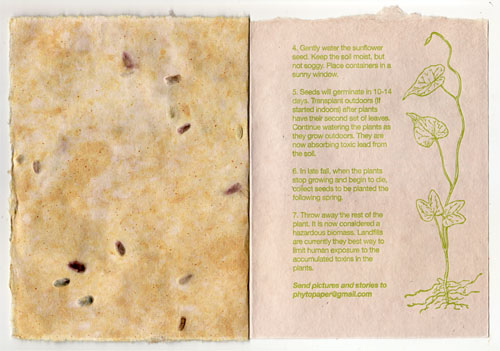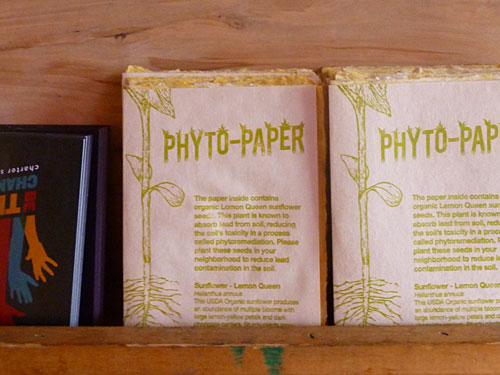MAGGIE PUCKETT
home
artist statement
cv
contact
Born 1981, Long Beach, California, USA
Lives and works in Chicago, Illinois, USA
Practicing a holistic approach to art making, Maggie Puckett combines the disciplines of papermaker, printmaker, bookbinder, graphic designer, plant midwife, seed saver, and urban gardener. Read More
.....................................................................................
maggie.puckett@gmail.com
Instagram: @maggiepuck
.....................................................................................
.....................................................................................
    |
COMMUNITY PROJECT Phyto-Paper Phyto-Paper contains organic Lemon Queen sunflower seeds. This plant is known to absorb lead from soil, reducing the soil’s toxicity in a process called phytoremediation. Please plant these seeds in your neighborhood to reduce lead contamination in the soil. This project was created by Maggie Puckett during the 2012 Winter/Spring Alumni Studio Access Award residency at the Center for Book and Paper, Chicago. Many thanks to the Center’s staff and faculty for helping make this project a reality. For recipients of the paper: Planting Instructions Instructions: 2. Make a hole in the soil about 1/2 inch deep (up to your first knuckle if using your finger). One hole per small container, or if planting outdoors, space holes 2 feet apart. 3. Remove seeds from the interior seed-paper and place one seed in each hole, covering it loosely with soil. 4. Gently water the sunflower seed. Keep the soil moist, but not soggy. Place containers in a sunny window. 5. Seeds will germinate in 10-14 days. Transplant outdoors (If started indoors) after plants have their second set of leaves. Continue watering the plants as they grow outdoors. They are now absorbing toxic lead from the soil. 6. In late fall, when the plants stop growing and begin to die, collect seeds to be planted the following spring. 7. Throw away the rest of the plant. It is now considered a hazardous biomass. Landfills are currently they best way to limit human exposure to the accumulated toxins in the plants. Send pictures and stories to phytopaper@gmail.com Definitions Hyperaccumulator Share Your Stories
For project updates and information about the artist:
|
 |
|
 |
|
 |
|
 |
|
 |
|
 |